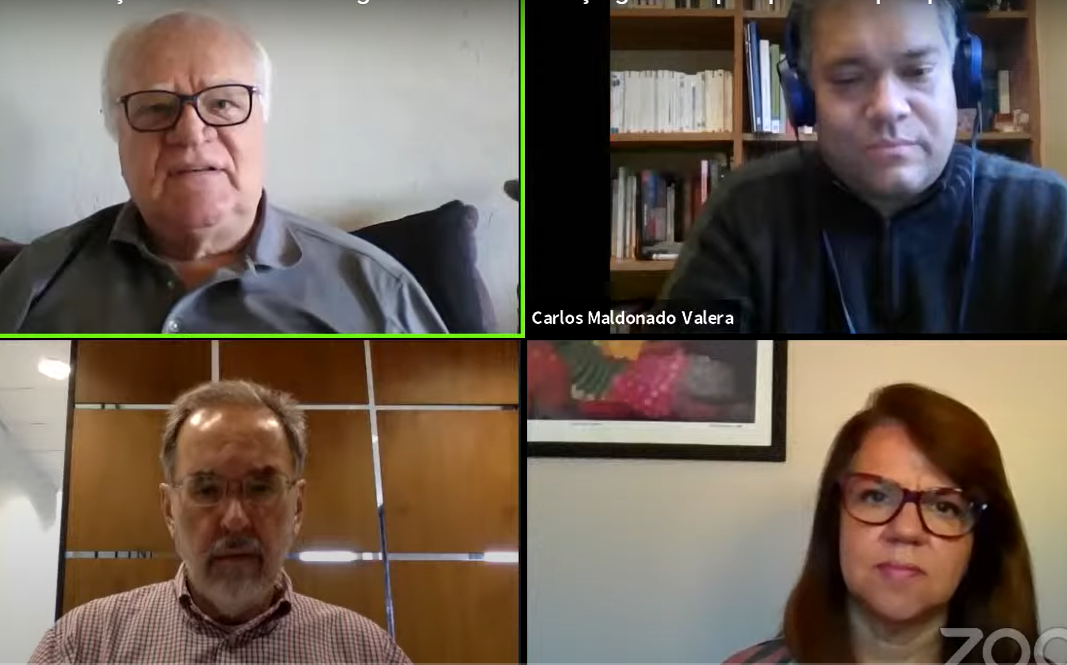Seminar debates current situation and 2030 Agenda perspectives
23/08/2021
Javier Abi-Saab (Fiocruz News Agency)
The post-pandemic perspectives on Agenda 2030 in relation to issues such as health, human rights, and climate were addressed by the Advanced Seminars of the Fiocruz Global Health Center (CRIS/Fiocruz) this Wednesday (August, 18th). The event Agenda 2030: global stocktake and post-pandemic perspectives presented an updated assessment of the Sustainable Development Goals (SDGs) at global, regional and national levels, pointing out criticisms and alternatives for the Agenda implementation.
The event was mediated by Paulo Buss, coordinator of CRIS/Fiocruz, who presented the 2030 Agenda construction history since its beginnings, fruit of the optimistic spirit of post-Cold War multilateralism involving a series of United Nations summits in the 1990s; through the Millennium Summit in 2000 that gave rise to the Millennium Development Goals; and up to the expansion of these goals in 2015 when they became the 17 SDGs, 169 goals, and 241 indicators with a deadline of 2030. Buss also explained that the 2030 Agenda proposes an alliance for development, a set of measures for its implementation, and its own governance.
Santiago Alcazar, a researcher at CRIS/Fiocruz added: "2030 Agenda is to this day the main map to follow to take us to the better world we visualized in the 90's". The diplomat highlighted its main problem. For him, while there is a consensus that the path to post-pandemic restoration and the future is 2030 Agenda, the Paris agreement, and the biodiversity commitments, there is a significant problem that prevents the agenda from being fulfilled: it does not attack the heart of the matter, that is, it does not criticize the system.
"Doesn't the system itself generate the opposite of what we want with the goals? Does it not generate poverty and concentration of income? Does it not generate hunger by prioritizing agribusiness over food sovereignty, and diseases and pandemics? Doesn't the system generate violence and wars?" questioned Alcazar, for whom the system also ends up embracing some alternatives that exist, and if we don't look and act on this critically, we will always be several steps behind the urgencies.
The structural challenge was reinforced by Armando Denegri, also a researcher at CRIS/Fiocruz, who pointed out the need to overcome imbalances and ask ourselves who benefits from the current power structure. "We must assume that there are beneficiaries who permanently strengthen their power and therefore there is a growing disparity that can even produce poverty in a planned way, which means a big challenge for the SDGs", said Denegri, for whom the resources to fulfill the right to development exist, but are located in the dynamics of the international financial market and do not land in the productive economy.
The environmental and climate change issue, one of the most relevant 2030 Agenda themes, was brought to the debate by Luiz Augusto Galvão, CRIS/Fiocruz researcher. Galvão pointed out that climate change influences everything that is alive on the planet, as well as the water, air, and temperature regimes, affecting all the goals of the Agenda and requiring urgent action. The researcher also pointed out the existing proposal to facilitate the implementation of the Goals through six transformative processes: 1) education, gender and inequality; 2) health, well-being and demographics; 3) energy decarbonization and sustainable industry; 4) sustainable food, land, water and oceans; 5) sustainable cities and communities; and 6) digital revolution for sustainable development.

The impacts of the pandemic for the Agenda 2030 implementation in Latin America were exposed by Carlos Maldonado Valera, social affairs officer at the Economic Commission for Latin America and the Caribbean (ECLAC, or CEPAL in the Portuguese acronym). "The pandemic has levied more than 1,370,000 deaths in Latin America, bringing complicated social, economic and environmental impacts that add up to four decades of low growth, wealth concentration and environmental deterioration in most countries. The pandemic deepens gender inequalities, increases food insecurity, and decreases income, which means that the pandemic is putting at risk the completeness of the 2030 Agenda Goals", Maldonado pointed out, highlighting that only a third of the 2030 Agenda Goals are on track in the region.
The ECLAC social affairs officer highlighted eight engines for igniting a sustainable economy and moving in the right direction, they are: energy transition, sustainable mobility, digital revolution, health industry, bioeconomy, care economy, circular economy, and sustainable tourism.
The data from the Spotlight report on the current status of the SDGs in Brazil were presented by Mônica Andreis, executive director of ACT health promotion and facilitator of the civil society working group for the 2030 Agenda. The Spotlight report indicates that Brazil will not be able to meet the SDGs if it does not adopt urgent measures for poverty eradication and sustainable development. Among other data, it points out that, of the 169 goals of the Agenda, 13 are making insufficient progress, 27 are stagnating, 21 are at risk, 92 are regressing, and none are making satisfactory progress.
"This translates into 27 million more people in extreme poverty, 113 million more food insecure, 19 million more hungry, 5 million more boys and girls out of school, 9% more homeless people, and increasing deforestation particularly in the Amazon region", said Andreis, for whom the problem is not just a lack of resources but a priorities choice.


